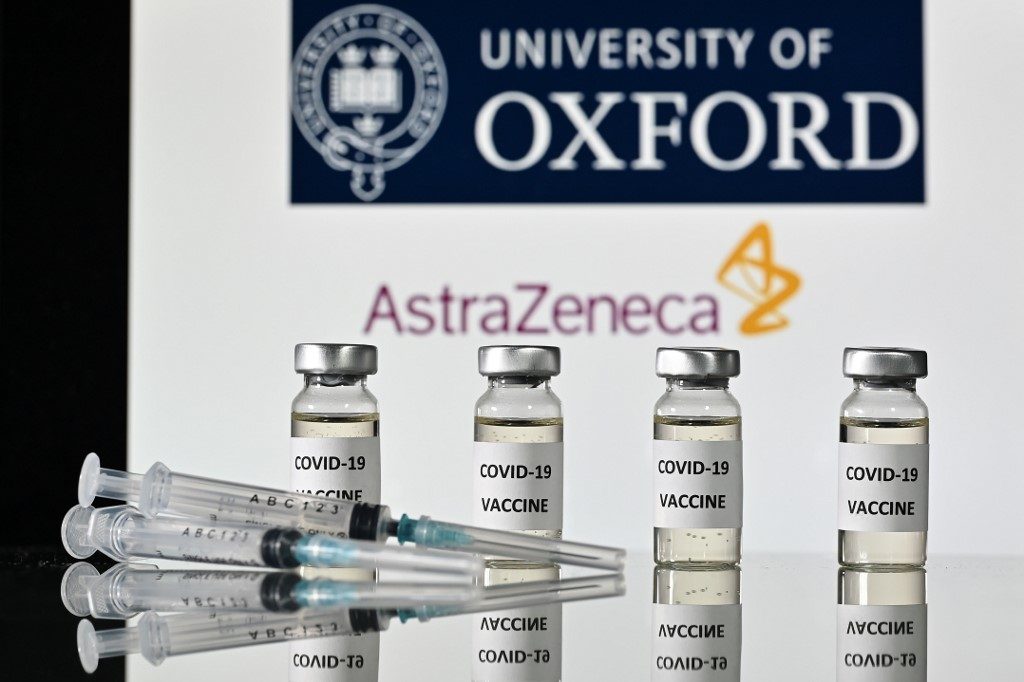SUMMARY
This is AI generated summarization, which may have errors. For context, always refer to the full article.

Over 30 business leaders inked a deal with the Philippine government for 2.6 million doses of AstraZeneca’s COVID-19 vaccine, worth around P700 million, on Friday, November 27.
Presidential Adviser for Entrepreneurship and Go Negosyo founder Joey Concepcion led the signing ceremony, along with vaccine czar Secretary Carlito Galvez Jr and Lotis Ramin, country president of AstraZeneca Philippines.
Half of the vaccines, expected to arrive around the 2nd quarter of 2021, will be donated to the government, while the other half will be for employees in the private sector.
The private sector signatories are:
- Mario Deriquito, BDO Foundation
- Richard Sanz, Philippine Franchise Association
- Michael Tan, Philippine National Bank
- Manny Pangilinan, Metro Pacific Investments Corporation
- Jhayner Bufi, LBC Express Holdings
- Dennis Uy, Udenna Corporation
- Carmelo Bautista, GT Capital Holdings
- William Belo, Wilcon Depot
- Paolo Borromeo, AC Health
- Maribeth Marasigan, Aboitiz Foundation
- Ted Belza Jr, Penshoppe
- Gerardo Borromeo, Philippine Transmarine Carriers
- Marlon Rono, Magsaysay People Resources
- Glenn Yu, Seaoil Philippines
- Ricardo Cuerva, Nova Group
- Andrew Gotianun, Filinvest Corporation
- Felcaster Torres, Yazaki-Torres Manufacturing
- Corazon Lim, Mercury Drug Corporation
- Jose Antonio, Century Properties Group
- Henry Lim Bon Liong, Federation of Filipino Chinese Chambers of Commerce and Industry
- Kenneth Cheng, Bounty Fresh
- Ronald Mascariñas, Bounty Agro Ventures
- Raul Concepcion, Concepcion Industrial Corporation
- Jose Maria Minana Jr, Jollibee
- Mukesh Advani, Federation of Indian Chambers of Commerce Philippines
- Edgar Sia, DoubleDragon Properties/MerryMart
- Jerome Ong, CDO Foodsphere
- Erwin Go, GUR LAVI Group
- Martin Yu, Shopee Philippines
- First Philippine Holdings Corporation
- Suyen Corporation
Key to this agreement were the efforts of the embassy of the United Kingdom led by Ambassador Daniel Pruce. Galvez has been saying for days that he had been in talks with the embassy on vaccine supply.
Concepcion also attributed the deal’s success to SM’s Tessie Sy-Coson and BDO president and chief executive officer Nestor Tan.
He noted that Coson and Tan helped reach out to AstraZeneca. Concepcion likewise called several business leaders while the talks were ongoing.
“Two weeks of calling, I sound like a beggar calling for everybody. But it turned around and we have a lot of support from the private sector,” Concepcion said.
He added that the private sector is looking for more sources of the vaccine aside from AstraZeneca, as the 2.6 million vaccines can only benefit up to 1.5 million people.
The vaccine is expected to cost around P500 or $10 for two doses.
The AstraZeneca vaccine is being developed with Oxford University in the UK.
The pharmaceutical firm has reported its vaccine is 70% effective against COVID-19. But experts have raised doubts after finding out that the second group of participants in the AstraZeneca trials were limited to people aged 55 and below, an age group with a lower risk of developing severe COVID-19 symptoms.
But it’s still a long way to go before the 2.6 million AstraZeneca vaccine doses are actually distributed to Filipinos.
The vaccine will still have to pass the UK’s regulatory process and get approval from the Philippines’ Food and Drug Administration. This critical approval could come as early as May to July 2021 or late next year, said Galvez.
Half to private sector
Christian Gonzalez of the Enrique Razon Jr-led International Container Terminals Services Incorporated (ICTSI), one of the private companies making the donation, said the “vast majority” of initial vaccine recipients will be “government employees, frontline health workers, and other essential services workers” as designated by the Department of Health.
ICTSI will use its share of the vaccine supply for its employees and those of the entire Razon Group, said Gonzalez.
But the firm will also devote some of its doses to employees of the Philippine Ports Authority, Bureau of Customs, and other essential port and logistics workers – frontliners who “made the biggest impact, especially at the beginning of the pandemic,” said Gonzalez.
The private sector has played a big role in the Philippines’ pandemic response. From donations of various goods, to testing employees and poor households, conglomerates have stepped in, as the government has drawn flak for how it is handling the crisis.
‘Affordable’
Galvez told President Rodrigo Duterte that the AstraZeneca-Oxford vaccine is the most affordable vaccine among those being negotiated for by the government, priced at around $5 per dose.
“At nakita natin ang AstraZeneca po maganda po dahil kasi non-profit po ang sa kanya at saka pinakamababa po ‘yung kanyang presyo, more or less $5 lang po,” the vaccine czar said during the November 23 meeting.
(We can see that AstraZeneca is good because it’s non-profit and it has the lowest price, more or less $5 only.)
Galvez praised AstraZeneca and the UK embassy for their “goal of providing equitable access” to the vaccine to developing countries like the Philippines.
Apart from AstraZeneca, Galvez has spoken of securing “20 to 50 million doses” of China’s Sinovac COVID-19 vaccine.
The Philippines aims to inoculate 60 million to 70 million Filipinos within 3 to 5 years. Some 35 million will belong to the first batch of recipients, a mix of poor households, healthcare workers, and frontline personnel.
To purchase these vaccines, the government is targeting a budget of P73.2 billion. Galvez is batting for a P150-billion fund in the 2021 national budget to shoulder expenses for a cold chain storage system necessary to distributing the vaccines. – Rappler.com
Add a comment
How does this make you feel?
There are no comments yet. Add your comment to start the conversation.